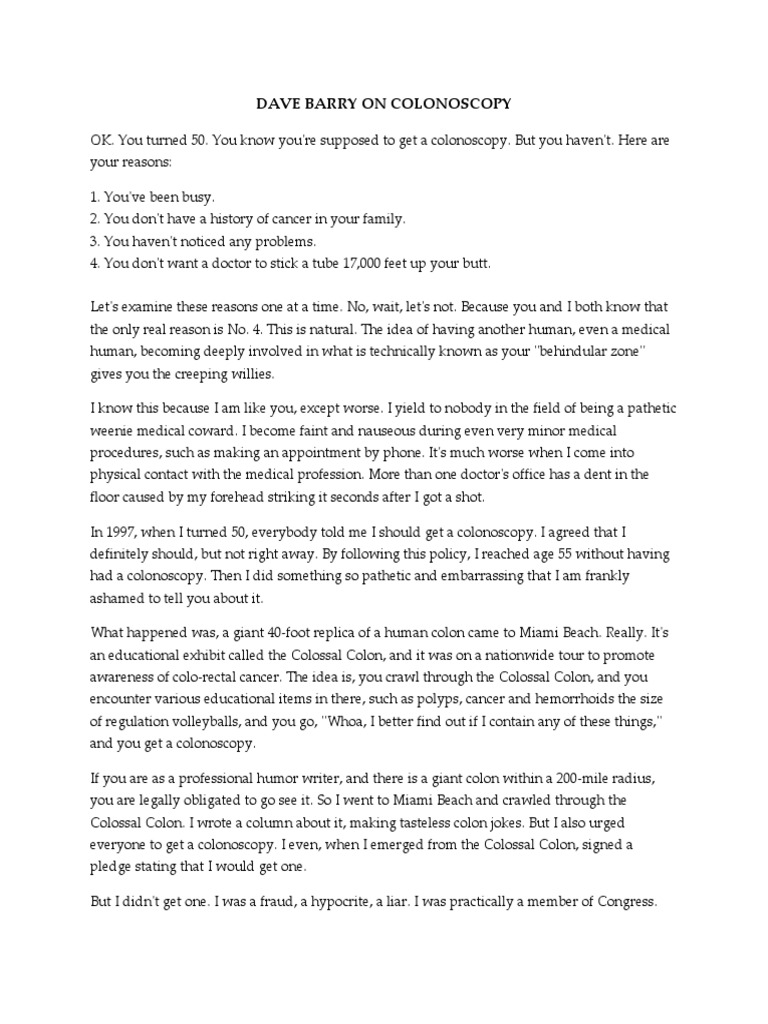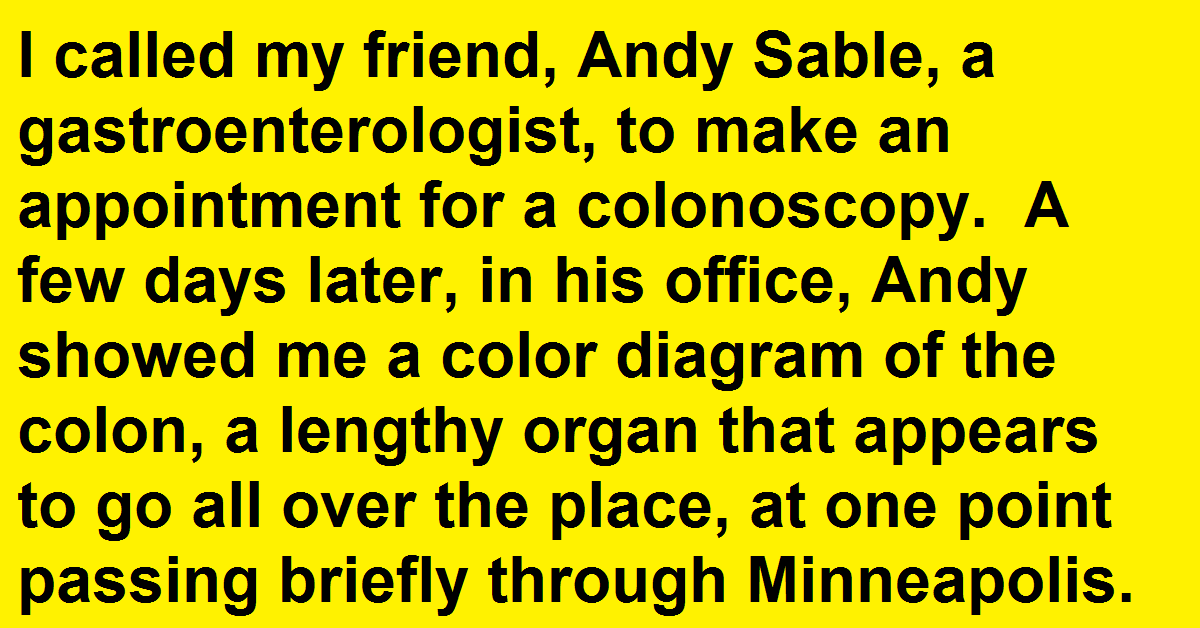Dave Barry, the Pulitzer Prize-winning humor columnist, once humorously recounted his colonoscopy experience, turning a potentially uncomfortable topic into light-hearted entertainment. His writings have not only provided laughs but also raised awareness about this essential medical procedure. In this article, we delve into the world of colonoscopies, exploring its significance, the procedure, and how humor can play a role in demystifying it.
Colonoscopies are crucial for early detection of colorectal cancer, a potentially life-threatening condition. Dave Barry's account sheds light on the procedure, making it less intimidating for those who might be apprehensive about undergoing it. Through his wit, he highlights the importance of regular screenings as part of preventive healthcare.
This article aims to provide a detailed overview of colonoscopies, including the procedure itself, preparation tips, potential risks, and the benefits of regular screenings. We will also explore how humor can play a pivotal role in easing anxiety surrounding medical procedures.
Read also:Aiken County Government A Comprehensive Guide To Services Leadership And Community Development
Table of Contents
- Dave Barry's Biography
- What is a Colonoscopy?
- The Importance of Colonoscopies
- Preparing for a Colonoscopy
- The Colonoscopy Procedure
- Potential Risks and Complications
- Aftercare and Recovery
- Benefits of Regular Screenings
- The Role of Humor in Healthcare
- Conclusion
Dave Barry's Biography
Dave Barry is an iconic American humorist, columnist, and author. Born on August 20, 1946, in Armonk, New York, Barry made a name for himself with his witty and satirical writing style. Below is a summary of his life and career:
Biographical Data
| Full Name | Dave Barry |
|---|---|
| Birthdate | August 20, 1946 |
| Place of Birth | Armonk, New York |
| Profession | Humorist, Columnist, Author |
| Notable Awards | Pulitzer Prize for Commentary (1988) |
What is a Colonoscopy?
A colonoscopy is a medical procedure used to examine the inner lining of the large intestine, including the colon and rectum. This examination is critical for detecting abnormalities such as polyps or signs of cancer. According to the American Cancer Society, colorectal cancer is one of the leading causes of cancer-related deaths in the United States, underscoring the importance of regular screenings.
Key Features of Colonoscopies
- Diagnostic Tool: Colonoscopies allow doctors to identify potential issues early on.
- Preventive Measure: Polyps detected during the procedure can be removed before they become cancerous.
- Minimally Invasive: The procedure is performed using a flexible tube with a camera, ensuring minimal discomfort for the patient.
The Importance of Colonoscopies
Colonoscopies play a vital role in preventive healthcare, particularly for individuals over the age of 50 or those with a family history of colorectal cancer. Early detection can significantly improve treatment outcomes and survival rates.
According to the Centers for Disease Control and Prevention (CDC), colorectal cancer screening can reduce deaths by up to 60%. Regular screenings ensure that any abnormalities are caught early, allowing for prompt treatment.
Preparing for a Colonoscopy
Proper preparation is essential for a successful colonoscopy. Patients are typically advised to follow a clear liquid diet for 24 hours before the procedure and use laxatives to ensure the colon is clean. Below are some preparation tips:
- Drink plenty of fluids to stay hydrated.
- Avoid solid foods for at least a day before the procedure.
- Follow your doctor’s instructions regarding medications.
Common Preparation Mistakes
Some patients may overlook the importance of adhering strictly to the preparation guidelines, which can affect the accuracy of the procedure. Ensure that you understand and follow all instructions provided by your healthcare provider.
Read also:Red Plate Diner A Journey Through The Heart Of American Dining Culture
The Colonoscopy Procedure
During the colonoscopy, the patient is usually sedated to minimize discomfort. A flexible tube called a colonoscope is inserted into the rectum, allowing the doctor to examine the colon's lining. If any polyps are detected, they can be removed during the procedure.
Steps Involved in the Procedure
- Sedation: Patients are given medication to help them relax.
- Insertion: The colonoscope is gently inserted into the rectum.
- Examination: The doctor carefully examines the colon's lining for any abnormalities.
Potential Risks and Complications
While colonoscopies are generally safe, there are some potential risks involved. These include bleeding, perforation of the colon, and adverse reactions to sedatives. However, these complications are rare, and the benefits of the procedure far outweigh the risks.
Managing Risks
Choosing an experienced healthcare provider and following all pre-procedure instructions can help minimize risks. Discuss any concerns with your doctor beforehand to ensure a smooth and safe experience.
Aftercare and Recovery
After the procedure, patients may feel groggy due to the sedatives and may need someone to drive them home. It is normal to experience mild discomfort or bloating, which usually subsides within a few hours. Doctors may provide specific aftercare instructions based on the individual’s health needs.
Signs to Watch For
Patients should contact their healthcare provider if they experience severe pain, heavy bleeding, or fever after the procedure. These symptoms could indicate complications that require immediate attention.
Benefits of Regular Screenings
Regular colonoscopies offer numerous benefits, including early detection of colorectal cancer, removal of precancerous polyps, and peace of mind for patients. By staying proactive about their health, individuals can significantly reduce their risk of developing serious medical conditions.
Long-Term Benefits
Studies have shown that individuals who undergo regular screenings have a lower incidence of colorectal cancer. This underscores the importance of adhering to recommended screening schedules, especially for those with increased risk factors.
The Role of Humor in Healthcare
Dave Barry’s humorous take on his colonoscopy experience demonstrates how laughter can alleviate anxiety surrounding medical procedures. Humor can create a more relaxed atmosphere, making patients feel more comfortable and less fearful.
Using Humor Effectively
Healthcare providers can incorporate humor into patient interactions to improve communication and build trust. However, it is essential to maintain professionalism and sensitivity to individual preferences and cultural differences.
Conclusion
Colonoscopies are a critical component of preventive healthcare, offering numerous benefits for early detection and prevention of colorectal cancer. Dave Barry’s humorous recounting of his experience highlights the importance of staying informed and proactive about one’s health.
We encourage readers to discuss colonoscopies with their healthcare providers and consider scheduling regular screenings. By taking control of your health, you can significantly reduce the risk of developing serious medical conditions. Share this article with friends and family to spread awareness and leave a comment below with your thoughts or questions.


